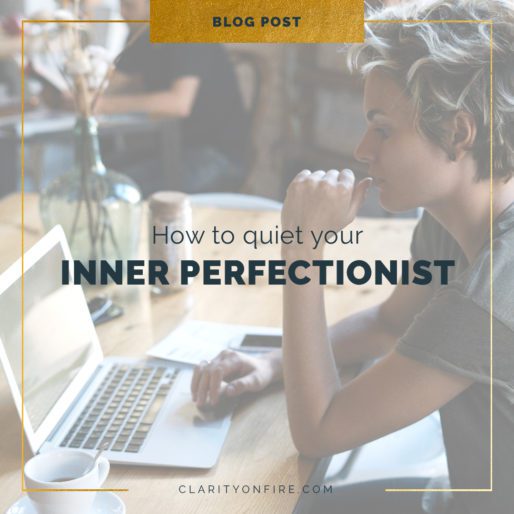Heads up! We’re announcing something special coming up in December at the end of this blog. Scroll down to get a preview! 🙂
If reading long blogs just isn’t your deal, you can listen to me read it instead!
(Click the orange play button to start playing right here on the page, or download and save it for later by clicking the downward arrow at the top right of the box below.)
I’ve had a love-hate relationship with the term “perfectionist” for most of my life.
Like most perfectionists, I was a tiny bit proud of the title, even though I knew it held me back sometimes.
Now, though, I no longer have mixed feelings. Now I just hate the term. Or, more accurately, I feel pretty neutral about it.
Frankly, at this point in my life, I can’t feel much about perfectionism except … exhaustion.
But let’s back up…
Throughout my life, I’ve hated being wrong or looking stupid or being bad at things. I mean, no one likes it, of course, but I took it to new extremes.
My parents say I started walking later than most toddlers because I didn’t want to walk until I could do it without falling down.
I vividly remember the sheer mortification I felt the first time I raised my hand in class and got an answer wrong. (It was in 2nd grade and it was about the water cycle.) I was the Hermione Granger of the class, always obnoxiously raising my hand with the right answer. I never got questions wrong, so I was stunned.
THE UGLY UNDERBELLY OF PERFECTIONISM
Several years ago, I went on a skiing trip with a group of friends. I was the only one in the group who had never skied before, so we didn’t do any kind of official lesson. I got a couple of pointers from my friends, and then I hit the bunny slope.
I sucked at skiing. I guess everyone probably does at first, but somehow I expected myself to pick it up instantly and keep up with all my friends.
Instead, I found myself spending more time trying to pry myself off the ground than I spent upright for at least the first hour or two.
My inner perfectionist was flipping out. I was so embarrassed about looking stupid and being so bad at this.
And yet, embarrassment isn’t something that a perfectionist can own up to because that would be openly admitting that you’re not, in fact, perfect.
So instead, I got mad and I got righteous. I got mad at myself for coming on this trip in the first place. I got mad at my friends for making me do this and for actually having fun doing something so stupid. And I got righteously mad at the entire sport of skiing for clearly being the most annoying, dumb, impossible sport ever created.
Essentially, I turned into a complaining brat who no one wanted to be around (and I don’t blame them!).
The next morning, I woke up with a shame hangover. My perfectionism had turned ugly, and I felt deeply embarrassed about how I’d acted.
At that point I knew … I wasn’t in control of my perfectionism anymore; it was in control of me.
I’ve made it a point over the past 4-5 years to, little by little, let go of my perfectionist ways. I still don’t like being bad at things (who does?), but it doesn’t bother me so much anymore.
If I went skiing again now, I’d probably fall down just as much, but I’d be cracking up the whole time. And once I got tired of it, I wouldn’t turn into the world’s biggest brat — I’d just head into the ski lodge and happily spend the rest of the day in front of the fire with a hot apple cider and a book.
PERFECTIONISM IS A TWENTY-TON SHIELD
Brené Brown, bestselling author, researcher, and speaker (she’s amazing — check her out), gives the best description of perfectionism I’ve ever heard in her book The Gifts of Imperfection:
“Perfectionism is not the same thing as striving to be your best. Perfectionism is not about healthy achievement and growth. Perfectionism is the belief that if we live perfect, look perfect, and act perfect, we can minimize or avoid the pain of blame, judgment, and shame. It’s a shield. Perfectionism is a twenty-ton shield that we lug around thinking it will protect us when, in fact, it’s the thing that’s really preventing us from taking flight.”
If most of us are walking around with the belief that being perfect = never feeling blame, judgment, or shame, it’s no wonder so many of us are perfectionists!
The trouble is, it’s terrible at protecting us from those things, and it usually makes them worse. Just like on that ski trip I took years ago, perfectionism can make you feel more self-critical, lonely, ashamed, and never quite good enough (no matter how confident you appear on the outside).
BEING A PERFECTIONIST IS LONELY
Perfectionism gets in the way of fully experiencing life. Here are just a few of the most damaging affects of perfectionism:
Perfectionists miss out on the deepest level of connection with others. When you’re so focused on being perfect, you’re not able to connect with people deeply. You’re too busy trying to manage your image, remember everything, do it all flawlessly, and make it look easy to boot. When you’re not willing to be vulnerable, you don’t create a safe space for others to be vulnerable, which means you never get to the deepest level of human connection.
Perfectionists are never fully self-expressed. You never feel good enough because you always worry, “If people knew this about me, they’d never accept me.” So you’re constantly playing a role. Any parts of yourself that don’t fit with the “perfect” image get shoved down into the back of a dark drawer and locked away, never to be seen by anyone.
Perfectionists pass up great opportunities. Because you’re so afraid of trying new things (in case you’re not instantly perfect at it) or looking stupid, you’ll likely pass up potentially amazing opportunities and experiences that might force you to step out of your comfort zone.
ALSO, PERFECT PEOPLE ARE BORING
I once had a client who was a self-admitted perfectionist. She always wanted to do or say the exact right thing at the exact right moment, and she chastised herself when she had a “down” day when she wasn’t happy and on top of everything.
I told her, “You’re trying so hard to be ‘Perfect Sara’ that you’re forgetting to be ‘Real Sara.’ And ‘Perfect Sara’? I’ve gotta say … she’s pretty boring. She’s so predictable and bland and, frankly, kind of annoying in her perfection. For the record, I like ‘Real Sara’ WAY more. She’s quirky and fun and messy and full of personality.”
I could tell she wanted to believe me, but she wasn’t quite convinced. So I asked her to think about the people she loves most in the world. “Why do you love these people so much? How ‘perfect’ are they?”
She went on to describe her best friend’s off-beat sense of humor, and her boyfriend’s weird obsession with old sci-fi movies, and her mom’s inappropriately loud laugh, and her dad’s lame puns.
She realized that she loved these people more because of their quirks and imperfections, not in spite of them.
![]() Despite what we all think, perfectionism isn’t attractive. It’s boring.
Despite what we all think, perfectionism isn’t attractive. It’s boring.
We’re all drawn to vibrant, interesting, quirky people who bring color into the world, and yet we don’t allow ourselves to be that way.
BREAKING THE GRIP OF PERFECTIONISM
Hopefully by now I’ve convinced you to give up your constant striving for perfection. If you’re thinking, “OK, I’m on board, but how do I actually do that?” … here are a few places to start:
Stop hustling for worthiness. You have inherent worth simply by being a living, breathing, feeling being. You don’t have to keep proving your worth. And you don’t have to be perfect in order to be loved, or even liked. In fact, the people who love you most don’t want you to be perfect. They want you to be real.
Be nicer to yourself. Perfectionism and self-criticism go hand-in-hand, so the gentler you are with yourself, the less compulsion you’ll feel to be a perfectionist. It’s old, tired advice, but it’s as true as the first time you heard it: Treat yourself the way you’d treat your best friend.
Remember your bigger-picture intention. Perfectionism tries to convince you that whatever you’re trying to do perfectly in the moment is the most important thing. That’s how perfectionism keeps you small. When I was skiing, my perfectionism wanted me to believe that being great at skiing was what was important. But when I zoomed out and examined my intention for being on that trip in the first place, I realized all I really wanted was to have fun with my friends for a weekend. That helped put things in perspective.
For all my fellow perfectionists (or recovering perfectionists) out there, how does perfectionism get in your way? Or how have you overcome it? Share your story with me in the comments!
Much Love,
Kristen (& Rachel)
PPSC HOLIDAY SPECIAL COMING DECEMBER 5TH
Imagine this: You’ve been asked to cook a dish you’ve never made, and you’ve got two choices. The first is to shrug your shoulders, guess at the ingredients and the steps, and hope your dish comes out well. The second is to follow a recipe and know your dish is a winner. It’s a no brainer, right? Why would you suffer through guesswork when you could just as easily be certain?
So … if you wouldn’t guess your way through making a meal, why in the world would you do it with something as important as your career?
The Passion Profile Short Course is like a recipe for your career path. It’s the “secret sauce” that takes the thought out of trying to plot your career direction and prevents you from wasting years of your life hopping from job to job, hoping that you eventually stumble across something you love.
If your career has you feeling stuck, confused, and overwhelmed, and if you’re starting to wonder if you might be “broken,” then the PPSC is the perfect place for you to start your new career journey.
You can get unstuck, feel confident that you’re on the right track, and build the foundation you need to have a thriving career and life — in as little as one day.
For one week only — from December 5th–12th — we’ll be offering the PPSC for $199 instead of its usual $249.
No need to do anything yet! We’ll remind you (and throw a few surprises your way) as we get closer to December 5th. This is just a heads up for those of you who want to jumpstart your direction before 2017 comes to an end. 🙂





Kristen, I almost laughed out loud when I saw that your perfectionist story had to do with skiing. Several years ago I went to Montana to a friend’s cabin to ski. Both of them mind you grew up skiing, and I had skied three times in….the Midwest. I fell. And kept falling. And worst of all, felt OUT OF CONTROL. And hated that everyone around me was trying to help me and that I was failing in front of them. So I went to do the last two runs of the day by myself on an “easy” path. First one, fine. Second one…I got lost and found my way on a black diamond and asked a very confused skier for directions, then somehow found myself at the ski lodge ON THE OTHER SIDE OF THE MOUNTAIN. I had to get picked up there after having to ask the ski lift person what side of the mountain I was on. The next day, we took the ski lift up and up and up and I realized I made a horrible mistake, and 4 people proceeded to ‘help me’ down the footpath as I was scooting on my butt. And that is when one of my dearest friends looked at me and said, “Tricia, I think not being good at skiing is a healthy experience for you, because you’re too used to being good at everything.” And she was right.
YES to all this! It’s like you’re reading my mind. I feel like my perfectionism has gotten worse as I’ve gotten older because the stakes seem higher – making a mistake or “failing” at 38 seems a lot scarier than failing at 20. I just wish the steps to becoming a recovering perfectionist were more concrete. If you told to me to stand on my head for 20 sec I could visualize doing that but being nicer to myself just seems so nebulous and hard to put into practice, especially since that inner self-critic has had 38 years of practice.
OMG, I can so relate to your skiing story! It’s painful how we contort ourselves to please our inner perfectionist and how we rather tolerate embarrassment than show that we aren’t perfect. As a recovering perfectionist myself, I’m on a mission to raise awareness about perfectionism and share honest stories about dealing with perfectionism and your story (and tips!) is so, so needed! Thanks for sharing it so courageously 🙂